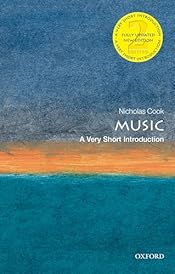Nicholas Cook "Music: A Very Short Introduction" (Oxford University Press)

I quite enjoyed this little book – and in general find the idea of the Very Short Introduction series a good one. I’m trying to learn about music, a topic which I know almost nothing about, and this was probably a good place to start. It doesn’t review any formal topics, more esoteric ones – the concept of the composer/artist as primary source, authenticity and relative importance of one genre vs. another.
Nicholas Cook's essay is largely about a philosophy of music. Eschewing any more than passing consideration of the international history of music, he acknowledges the diversity of music but starts his intellectual journey with Beethoven and his more detailed examples are drawn more from 'Classical' music than Rock or Pop. Despite this, the main thrust of his argument is about our response to music and its creation; there is nothing here about musical structures or forms. As this idea of involvement and perception develops, the book becomes increasingly academic. This is a short sharp introduction for the intelligent articulate non-musicologist who might consider studying further. I imagine that someone seeking such a grounding would prefer this to be the opening of a larger book while those to whom brevity is critical would prefer a broader more superficial approach.
A good read, nonetheless.

I quite enjoyed this little book – and in general find the idea of the Very Short Introduction series a good one. I’m trying to learn about music, a topic which I know almost nothing about, and this was probably a good place to start. It doesn’t review any formal topics, more esoteric ones – the concept of the composer/artist as primary source, authenticity and relative importance of one genre vs. another.
Nicholas Cook's essay is largely about a philosophy of music. Eschewing any more than passing consideration of the international history of music, he acknowledges the diversity of music but starts his intellectual journey with Beethoven and his more detailed examples are drawn more from 'Classical' music than Rock or Pop. Despite this, the main thrust of his argument is about our response to music and its creation; there is nothing here about musical structures or forms. As this idea of involvement and perception develops, the book becomes increasingly academic. This is a short sharp introduction for the intelligent articulate non-musicologist who might consider studying further. I imagine that someone seeking such a grounding would prefer this to be the opening of a larger book while those to whom brevity is critical would prefer a broader more superficial approach.
A good read, nonetheless.
